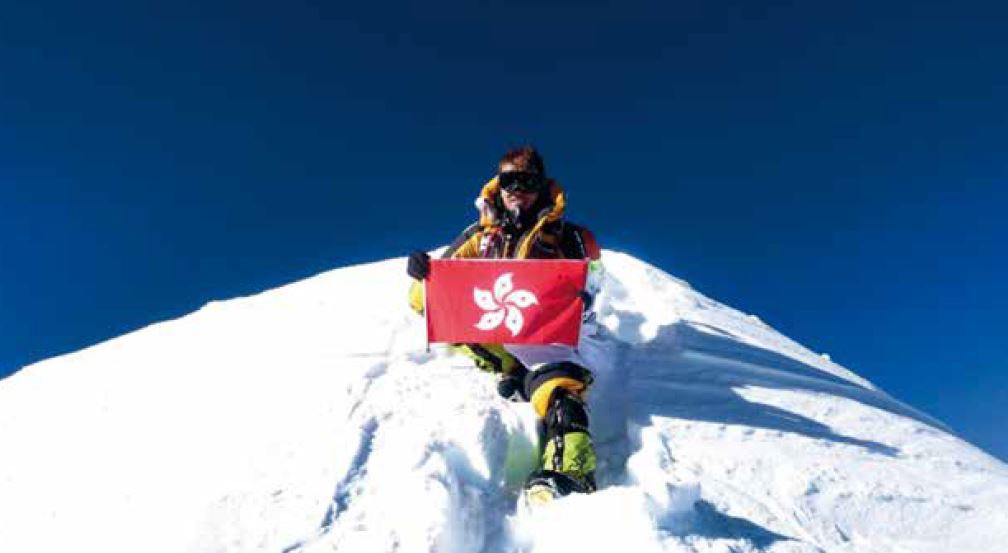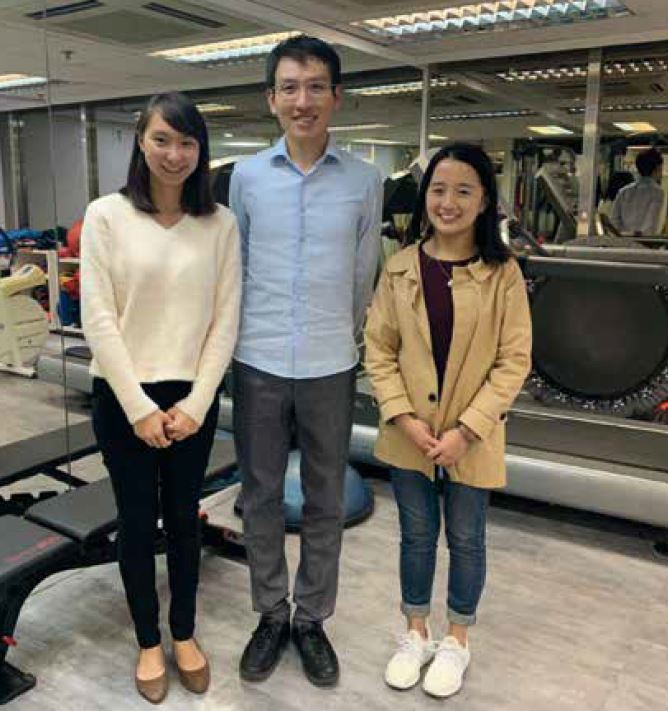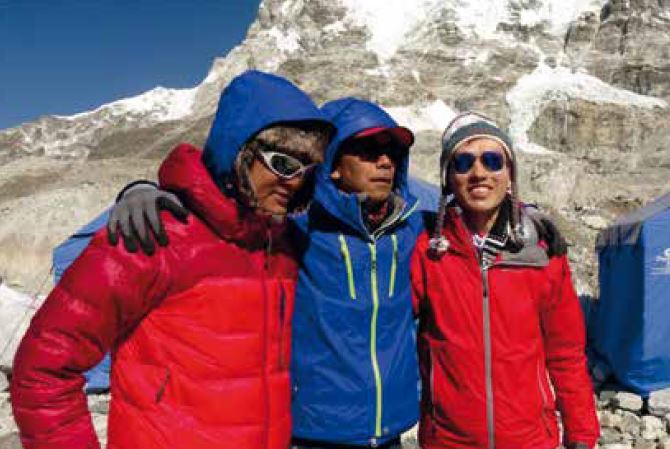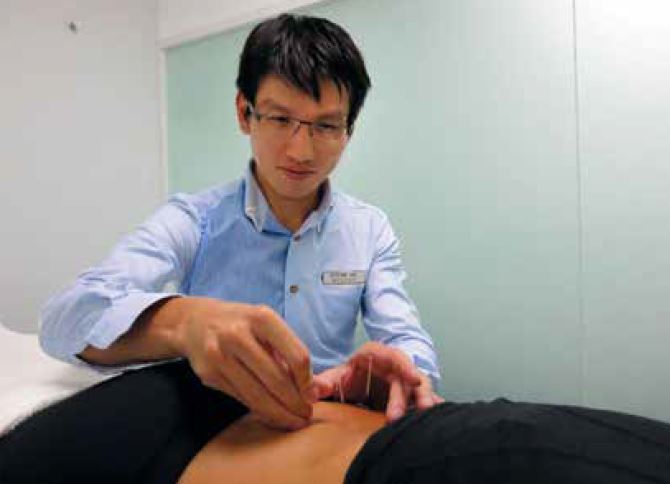© Hong Kong Academy of Medicine. CC BY-NC-ND 4.0
HEALTHCARE FOR SOCIETY
Physiotherapy at the peak: interview with Mr Elton Ng
Waylon Chan, MB, ChB1; Apple Lo, MB, ChB2; Katherine Wong, MB, ChB3
1 Department of Psychiatry, Castle Peak Hospital, Hong Kong
2 Accident and Emergency Department, Queen Mary Hospital, Hong Kong
3 Accident and Emergency Department, Princess Margaret Hospital, Hong Kong
Conquering Mount Everest is no easy feat, requiring
levels of physical fitness, perseverance, endurance,
and stamina that can elude even seasoned athletes.
Training patients who are undergoing recovery
after organ transplant to accompany you on the
ascent to Base Camp is an even more impressive
accomplishment. Mr Elton Chun-ting Ng, the
physiotherapist who achieved this, has been featured
in numerous shows and news segments over his
mountaineering successes, and he works tirelessly to
promote organ donation.
With an athletic mindset and a desire to help
people recover to their full physical potential, Mr Ng
was naturally attracted to the field of physiotherapy.
He studied physiotherapy at The Hong Kong
Polytechnic University, and graduated in 2000. He
began his career working in public hospitals of the
Hong Kong Hospital Authority. Much of his work at
this time involved acute rehabilitation, which focuses
on recovery shortly after an injury, mainly for patients
of the orthopaedics, geriatrics, and obstetrics and
gynaecology departments. This rehabilitation mainly
involves maximising patients’ physical function
within a short time frame, to facilitate discharge
and prevent further complications due to inactivity.
During his training, Mr Ng developed a specific
interest in extended physiotherapy care, where he
could accompany patients in their long recovery
journey, refining and fine-tuning their physical
strength and stamina, with the goal of reaching or even exceeding their prior capabilities. After 7 years
in the public sector, Mr Ng established a private
practice to further his physiotherapy interests, and to
specialise in rehabilitation and sports physiotherapy,
personally engaging with each patient through their
recovery journey. Mr Ng found that he was then able
to dedicate more time and effort to his patients, as
well as integrating different modalities of therapy not
available in the public sector, such as hydrotherapy,
massage and manipulative therapy, East-meets-West
techniques, and modern acupuncture. “I have gained
a great sense of satisfaction from each patient,” says
Mr Ng of his 15 years of private practice, “and a deep
sense of personal connection and involvement.”
Mr Ng’s interest in mountaineering also began
at an early age, not least because it is “free” spiritual
retreat. Taking advantage of the trails and hills
near to his home, by age 21 years, he had already
conquered over 250 of the highest peaks in Hong
Kong and dreamed of hiking outside of Hong Kong.
He recalls having opportunities to volunteer as a
team physiotherapist to provide services for Hong
Kong team athletes overseas. He gladly volunteered
and remained in southeast China and Europe after
the tour ended in order to hike different mountains.
At a young age, he won multiple mountain marathon
competitions and hiked in over 40 countries, while
always looking for new challenges to overcome.
With time, he extended the scope of his interest
to rock climbing, and to ice and snow climbing. In 2016, he was featured on local television in TVB’s
‘Peak to Pit’ (天與地), which detailed his journey to
climb the arduous Manaslu in the Himalayas, which,
at 8163 m, is the 8th highest mountain in the world.
Mr Ng found that work in private practice
offered enough freedom to flexibly allocate his
time to his passions and charitable work. Eager to
contribute to society and to combine his hobbies with
philanthropy work, he initially started organising
health screening, offering sports day sponsors and
organising sports events for patients recovering
from stroke, with rheumatological diseases, or
with intellectual disability. In the mid-2010s, while
conquering summit after summit across the globe,
he had an idea that initially seemed outlandish: to
bring patients trekking with him while climbing the
tallest mountain in the world. He had previously
encouraged patients to hike with him, while video-taping
his hikes, to set goals for his patients and
encourage them to push their limits. However, these
efforts were limited to the familiar mountains of
Hong Kong. During these hikes, he commonly heard
patients doubt their abilities and recovery potential,
believing they could never surpass their previous
physical strength. “An attempt to trek or climb
Mount Everest, with its hostile climate and limited
oxygen levels, would be a new level of challenge for
both myself and my patients,” explained Mr Ng, “and
I was sure that overcoming this challenge would
dispel such falsehoods.”
He reached out to two patients who had
undergone kidney transplant and who he had been
training for a long time. After months of intense
training and preparation work, they headed out to
Nepal in 2017. “It was not a smooth journey,” recalled
Mr Ng, “The photographer became sick during the
early part of the hike, so I had to take over recording
the journey as well as keeping an eye on my patients’
health.” With perseverance and determination, as
well as the prior physiotherapy treatment, they were
able to reach Base Camp (5334 m) in early April.
Mr Ng continued to the summit of Mount Everest
(8848 m) in late May. Through this climb, he garnered
significant attention, encouraging many people to
register for organ donation, so that more patients
could be offered a new lease of life, and potentially
the opportunity to embark on similar adventures. To
facilitate promotion of organ donation, Mr Ng was
made “Life Invigorating Ambassador” of the Hong
Kong Transplant Sports Association in 2009.
The COVID-19 has disrupted the plans of
many, but neither did it stop Mr Ng from continuing
his charitable work and promoting organ transplants,
nor did it diminish his passion for hiking. He
continued raising funds for organ donation charities
through completing hiking challenges. In January
2021, Mr Ng and his colleague hiked the tallest
100 peaks in Hong Kong in just 72 hours, setting a
new record. Through such feats of mountaineering,
Mr Ng hopes to encourage more patients going
through recovery to take up hiking, as it helps
with both physical and psychological recovery, providing a sense of accomplishment while being a relatively safe sport given adequate preparation and
equipment.
Especially now, in this era of technological
advances, continuous learning is key to get a head
start in any career. “As a professional physiotherapist,”
Mr Ng advises, “one has to keep abreast of recent
breakthroughs in medicine, in particular in
orthopaedic surgery and unconventional modalities
for rehabilitation.” Aside from physiotherapy and
medicine, Mr Ng also keeps his mind nourished
by expanding the soft skills that are indispensable
for his career. Step-by-step, Mr Ng has acquired
skills for campaigning, marketing, and logistics
management in which he has found life-long value
for his professional growth. He is more than grateful
for all the hiccups he encountered in the past that
make him who he is today. “Always be prepared
and eager to learn, since you never know when
opportunity will strike,” he said.





